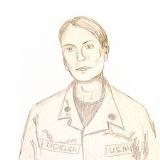
Suzanne Lachelier
Encyclopedia
Suzanne Lachelier is an American
lawyer and commander
in the United States Navy
.
Lachelier lived in France, in Orgeval
, until 1983. She is fluent in French. She graduated from Boston University School of Law
in 1992.
Lachelier is notable for the legal struggle she had to go through before she was allowed to meet Ramzi bin al-Shibh, a Guantanamo captives she was called upon to defend before Guantanamo military commissions.
Her clients were held in a top secret location. They had to wear hoods when they were transported to and from court. One of her clients refused to leave his cell, and she had never met him. She petitioned the Presiding Officer to be allowed to visit him at the secret site—something she was prohibited from doing, because she was not authorized to know its location.
She offered to wear a hood, just like her clients, while being transported to and from the site, so she wouldn't learn its location.
On 18 November 2008 Lachelier and her co-counsel, Rich Federico, were allowed to visit the site, without being forced to wear a hood.
They were however transported in the same windowless van used to transport the captives, so they wouldn't learn the camp's location.
Bin al Shibh's mental health was in question. During the earlier, Presidentially authorized, military commissions, struck down by the United States Supreme Court in Hamdan v. Rumsfeld
, suspects were not allowed to defend themselves, nor were they free to choose not to attend their commissions. The military commissions that were later authorized by the United States Congress
, through the Military Commissions Act of 2006
In May 2008 Lachalier played a key role in arranging for another of her clients, Ibrahim Al Qosi, to make his first phone call home.
United States
The United States of America is a federal constitutional republic comprising fifty states and a federal district...
lawyer and commander
Commander (United States)
In the United States, commander is a military rank that is also sometimes used as a military title, depending on the branch of service. It is also used as a rank or title in some organizations outside of the military, particularly in police and law enforcement.-Naval rank:In the United States...
in the United States Navy
United States Navy
The United States Navy is the naval warfare service branch of the United States Armed Forces and one of the seven uniformed services of the United States. The U.S. Navy is the largest in the world; its battle fleet tonnage is greater than that of the next 13 largest navies combined. The U.S...
.
Lachelier lived in France, in Orgeval
Orgeval
Orgeval is a commune in the Yvelines department in the Île-de-France region in north-central France named after the river that runs through it, a tributary of the Grand Morin river....
, until 1983. She is fluent in French. She graduated from Boston University School of Law
Boston University School of Law
Boston University School of Law is the law school affiliated with Boston University, and is ranked #22 among American law schools by US News and World Report magazine. It is the second-oldest law school in Massachusetts and one of the first law schools in the country to admit students regardless...
in 1992.
Lachelier is notable for the legal struggle she had to go through before she was allowed to meet Ramzi bin al-Shibh, a Guantanamo captives she was called upon to defend before Guantanamo military commissions.
Her clients were held in a top secret location. They had to wear hoods when they were transported to and from court. One of her clients refused to leave his cell, and she had never met him. She petitioned the Presiding Officer to be allowed to visit him at the secret site—something she was prohibited from doing, because she was not authorized to know its location.
She offered to wear a hood, just like her clients, while being transported to and from the site, so she wouldn't learn its location.
On 18 November 2008 Lachelier and her co-counsel, Rich Federico, were allowed to visit the site, without being forced to wear a hood.
They were however transported in the same windowless van used to transport the captives, so they wouldn't learn the camp's location.
Bin al Shibh's mental health was in question. During the earlier, Presidentially authorized, military commissions, struck down by the United States Supreme Court in Hamdan v. Rumsfeld
Hamdan v. Rumsfeld
Hamdan v. Rumsfeld, 548 U.S. 557 , is a case in which the Supreme Court of the United States held that military commissions set up by the Bush administration to try detainees at Guantanamo Bay lack "the power to proceed because its structures and procedures violate both the Uniform Code of Military...
, suspects were not allowed to defend themselves, nor were they free to choose not to attend their commissions. The military commissions that were later authorized by the United States Congress
United States Congress
The United States Congress is the bicameral legislature of the federal government of the United States, consisting of the Senate and the House of Representatives. The Congress meets in the United States Capitol in Washington, D.C....
, through the Military Commissions Act of 2006
Military Commissions Act of 2006
The United States Military Commissions Act of 2006, also known as HR-6166, was an Act of Congress signed by President George W. Bush on October 17, 2006. Drafted in the wake of the Supreme Court's decision on Hamdan v...
In May 2008 Lachalier played a key role in arranging for another of her clients, Ibrahim Al Qosi, to make his first phone call home.

